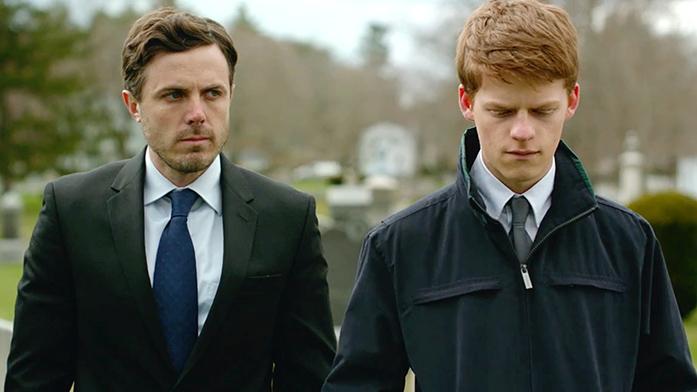By Austin Henderson
Manchester by the Sea opens with footage of the islets off the New England coast. Viewed from the possible vantage point of a seagull, the bleakness of late fall is captured in full force.
In the ever-present Boston snow, we are shown protagonist Lee Chandler (Casey Affleck) in his work as a janitor. Angry and bitter, haunted by the mistakes of his past, he drinks to escape from reality, often winding up in yet one more bar fight.
Plucked out of his life of outward futility upon hearing of the death of his brother, he is forced to set aside his personal demons in order to care for his teenage nephew Patrick (Lucas Hedrick), to whom, in an unexpected twist, he has become legal guardian.
In order to care for Patrick, Lee must return to the small coastal Massachusetts town of his youth, Manchester. Here memories of his haunted past reawaken in full force. In the small insular world of Manchester, he cannot escape his sense of guilt over the past, which the locals continually remind him of, distrusting him greatly.
Lee travels from breakdown to breakdown, caught several times by his late brother’s best friend George (C.J. Wilson). Patrick is struggling to navigate through the adolescent themes of sex, love, and self-discovery, compounded by the loss of his father — a task with which the emotionally crippled Lee is not able to help.
The excellent duo of Affleck and Hedrick provide an ideal setting for showing differing reactions to the loss of loved ones. Throughout the film, rather than reacting with the typical sadness or grief, the two seem to only possess the emotions of anger and frustration. This anger is often broken up by the lovable George, who seems to have everyone’s best interests at heart.  The anger that Lee and Patrick have at the loss of their brother and father, respectively, seeps into their relationship with one another. Lee resents the burden of caring for another person when he cannot take care of himself, and Patrick holds the angry, bitter man who has taken his father’s place in contempt, in a classic adolescent power struggle. There are moments in which their relationship seems to improve, only to crash like the waves often shown rolling into the Manchester harbor.
The anger that Lee and Patrick have at the loss of their brother and father, respectively, seeps into their relationship with one another. Lee resents the burden of caring for another person when he cannot take care of himself, and Patrick holds the angry, bitter man who has taken his father’s place in contempt, in a classic adolescent power struggle. There are moments in which their relationship seems to improve, only to crash like the waves often shown rolling into the Manchester harbor.
The cinematography throughout the film is immaculate. Making heavy use of flashbacks, we are shown the tortured past from which Lee cannot escape. In the two hours of running time, there is hardly a respite from the emotionally charged content. The bleakness of the story is mirrored in the grayness of the landscape and the omnipresent water off the coast.
The soundtrack in itself is a great work of art. Abandoning contemporary music in favor of blues and jazz standards, we get a sense of Manchester as a place caught in time.
The end of the movie’s 137-minute running time mirrors real life. Eschewing the Hollywood trope of a climactic resolution in the film’s final minutes, there are no happy heroics ensuring moviegoers leave with a renewed faith in the universe. This is perhaps the movie’s strongest asset, a steadfast realism steeped in the inertia of personal change. Despite several false resolutions, we are left with the same grayness of the harbor.







